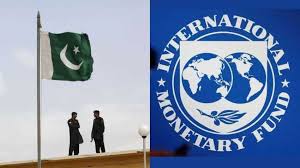WASHINGTON: The International Monetary Fund is ready to support cash-strapped Pakistan in key reform to help the country improve and stabilise its economic situation.
Currently, Pakistan has expressed interest in a new programme in order to help the country address some of the key challenges, Jihad Azour, Director of the Middle East and Central Asia Department at the IMF told reporters here on the sidelines of the annual Spring Meetings of the IMF and the World Bank.
The current programme that was initiated 10 months ago allowed Pakistan to achieve a certain number of important milestones in terms of economic stability, he said.
The last review was successful and will be put forward to the board, which will end a programme that helped Pakistan address acute economic imbalances and maintain its economic stabilities, the IMF official hoped.
“Those measures also allowed Pakistan to increase its buffers. Currently, the authorities have expressed interest in a new programme in order to help Pakistan address some of the key challenges,” Azour said.
One is to preserve macroeconomic stability and this would require continuing the work on the fiscal side in order to reduce the level of budget deficits and strengthen the fiscal situation by improving the revenue situation, which was one of the main challenges in the past, the IMF official said.
Increasing revenues will allow the government not only to address the debt situation but also to have the room to provide additional social support. The second pillar is the reform of the energy sector.
“This is a priority that has been there for some time, but it’s still an important reform dimension for Pakistan,” he said.
“Three is to increase the potential of this economy to grow. Pakistan is a large economy with a large potential. Levelling the playing field, improving the business environment, and allowing the private sector to have more space internally and also on the export side will help Pakistan. Those are the key pillars that Pakistan would need in order to improve its situation and the Fund is ready to support,” Azour said.
According to Azour, the package of reform is now more important than the size of the programme.
“Markets reaction was positive. We saw additional inflows; reserves have been rebuilt at the level of the central bank and even growth prospects have improved. Therefore, I think what is important at this stage is to accelerate the reforms, and double down on the structural reforms in order to provide Pakistan with its full potential of growth,” he said.
“Yes, we have had several programmes, but the priorities are still there and therefore the Fund is ready to assist when the government asks for that. And I think also bilateral partners of Pakistan are looking forward to the programme to extend their additional financial support to Pakistan,” Azour said.
Pakistan’s Finance Minister Muhammad Aurangzeb is currently in the American Capital to attend the IMF meetings and hold talks with them.
Pakistan has been facing staggering economic and security challenges.
Washington-based IMF’s global team reached a staff-level agreement with the Pakistani authorities last week on the second and final review of Pakistan’s stabilisation programme supported by the global lender’s USD 3 billion standby arrangement approved in July last year.


